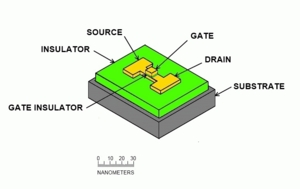GIBRALTAR--(Marketwire - Jun 14, 2011) - Avto Metals plc today disclosed several key features of the quantum transistor for which it recently received a U.S. patent. The Avto Quantum Transistor™ (AQT) is the first disclosed transistor to exploit the ability of a tunneling electron to either constructively or destructively interfere with the wave function of electrons in a gate material to modulate an electrical signal.
The AQT is expected to be smaller and faster, use less power, generate less heat, and be easier to manufacture than any thus-far announced transistor, including advanced-concept transistors being pursued by several semiconductor companies, such as Intel Corporation's recently-announced 3-D transistor, which is manufactured using a 22-nanometer process.
According to Dr. Hans Walitzki, the company's director of product development, "The AQT design exploits the unique Avto surface geometry to harness electron wave properties and manipulate current flow.
"We expect this transistor design to be of interest to many parties pursuing energy-efficient, cooler-running and faster-switching transistor products. We anticipate especially substantial benefits accruing to OEMs and users of space-based electronic systems, military electronics, and other customers for whom low energy-consumption, high performance and system reliability are mission enablers."
The new AQT design offers several improvements on existing transistors. Among them:
Metallic conductor construction. Instead of using typical semiconductor materials for current conduction, the Avto design uses a metal conductor, which provides lower resistance, resulting in lower electrical losses and less heating.
Low gate-capacitance. The AQT's gate capacitance is much lower than that of emerging 3-D semiconductor designs, such as the newly-announced Intel 3-D device. The AQT's gate is a small island, as compared to a three-dimensional structure surrounding multiple current-conducting "fins." The smaller gate area results in lower gate capacitance, and enables faster switching speeds and lower power consumption at higher speeds.
Radiation hardness. The Avto device sits upon a solid insulator, or alternatively an isolating film, on a bulk wafer, and thereby meets or exceeds the radiation hardness of a standard SOI "silicon-on-insulator" or "silicon-on-sapphire" device. Instead of relying on an imperfect depletion layer material to prevent leakage current and single-event effect (SEE) charges from ionizing radiation from impacting the transistor, the AQT's thicker insulating layer between the substrate and the transistor provides superior shielding.
Other proposals in recent years for quantum-effect transistors have included the Aharanov-Bohm quantum phase transistor, a quantum well transistor, a quantum-tunneling transistor and quantum diffraction transistor.
The Avto transistor is described in U.S. Patent 7,893,422, titled "Transistor on the Basis of New Quantum Interference Effect." The patent describes a quantum interference transistor comprising a thin metal film with source and drain zones, an insulating layer above the thin film that is several angstroms thick, and a smaller metal island, the gate, on top.
"The Avto transistor works because of a quantum interference effect in the thin film," explains Dr. Walitzki. "Depending on the island voltage, a potential barrier created by quantum interference exists (at V=0) and does not exist (at V=Vc). When the potential-barrier exists it is a case of a closed transistor and when no potential-barrier exists it is a case of an open transistor.
"Our ability to harness these effects stems from our patented application of nanoscale manufacturing technologies, which allow us to fabricate surface geometry features with such detail that electron wave properties become significant."
The net benefit of this new transistor is a more perfect "open" or "closed" condition, resulting in lower leakage currents, lower noise, and lower power consumption compared to conventional semiconductor devices. The technology can be employed in most modern semiconductor manufacturing processes.
Following the recent issuance of U.S. Patent 7,893,422, Avto Metals is looking to work jointly with research partners in industry and academia to build and evaluate pilot devices incorporating the Avto Quantum Transistor, and quantify its performance in detail, including:
- current leakage,
- work done by the gate,
- material heating; and
- how dimensional changes caused by heat or manufacturing variation might affect device performance.
After the next stage of technology development has been completed, Avto Metals expects to license its transistor technology to one or more manufacturers of integrated circuits.
"Avto Metals has been developing this technology for more than a decade, and the inherently efficient AQT design will bring performance benefits to electronic hardware of all types," said Dr. Walitzki, "including portable devices with limited power consumption.
"The inherent rad-hardness of the AQT design will also deliver significant advantages in space electronics, spacecraft and satellite applications," he added. "We're particularly excited about the capabilities the AQT technology will unlock for customers who require high-performance computing and signal processing in demanding environments.
"Our goal now is to rigorously quantify these capabilities and deliver AQT products to the market."
The company also said that it has recently received two additional U.S. patents covering related technologies the company is developing. One, U.S. 9,735,954, issued May 3 and titled "Artificial Band Gap," discloses a method for the induction of a suitable band gap and electron emissive properties into a substance.
The other, U.S. 9,728,630, issued April 19 and titled "Monolithic Thermionic Converter," discloses a thermionic converter comprising a single or multiple hot (emitter) and cold (collector) electrodes mounted side-by-side on a single substrate and a static electrostatic field for guiding electrons from the emitter to the collector. Both of these patents take advantage of the experimentally demonstrated Avto Effect. Full texts of all patents are available on the company's website, www.avtometals.gi.
Avto Metals plc, based in Gibraltar, is a subsidiary of Borealis Exploration Limited (
Contact Information:
For more information contact:
Dr. Hans Walitzki
Director of Product Development
Avto Metals plc
AQT@avtometals.gi
Avto Metals website: http://www.avtometals.gi
Borealis website: http://www.borealis.gi
